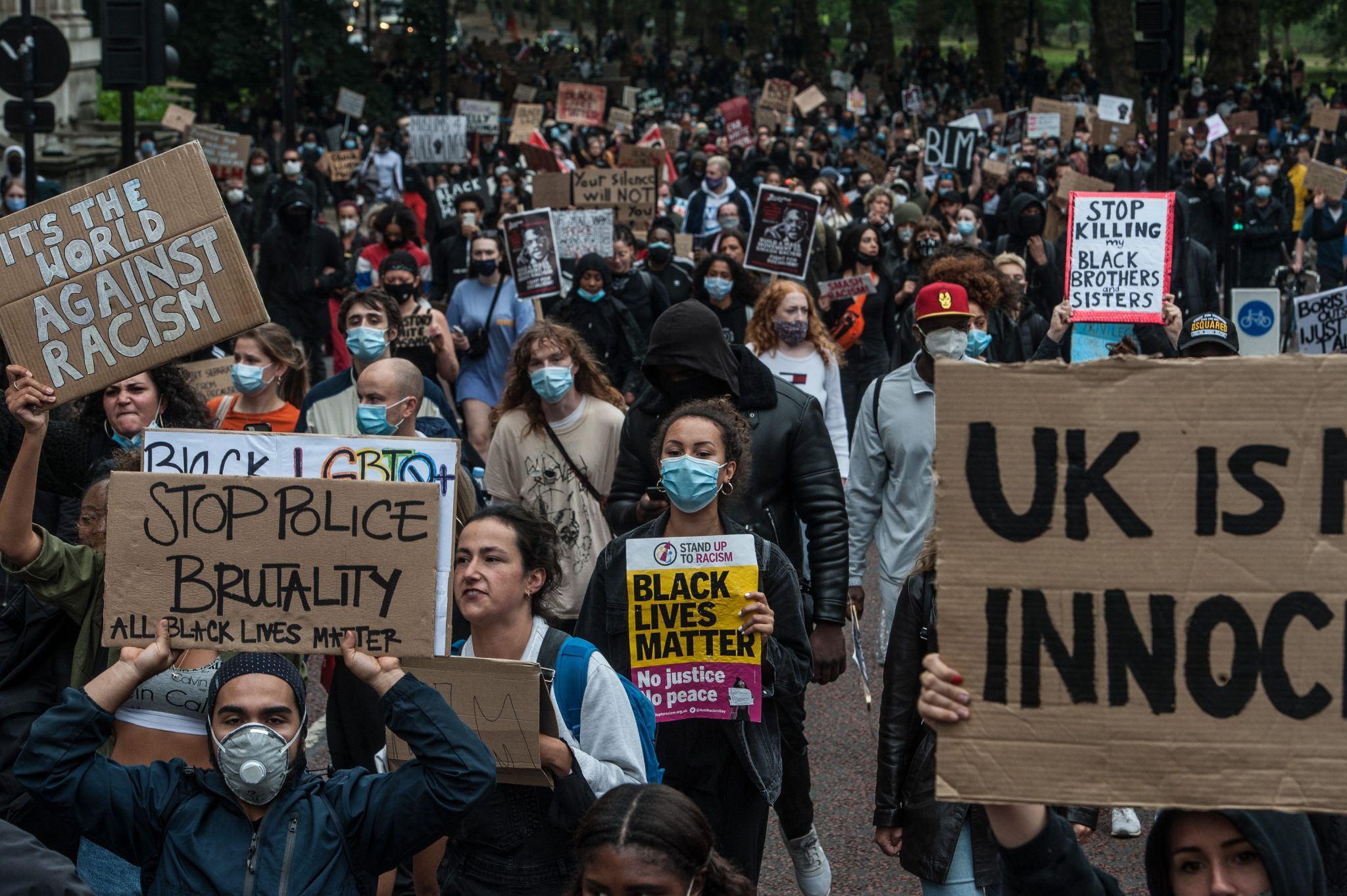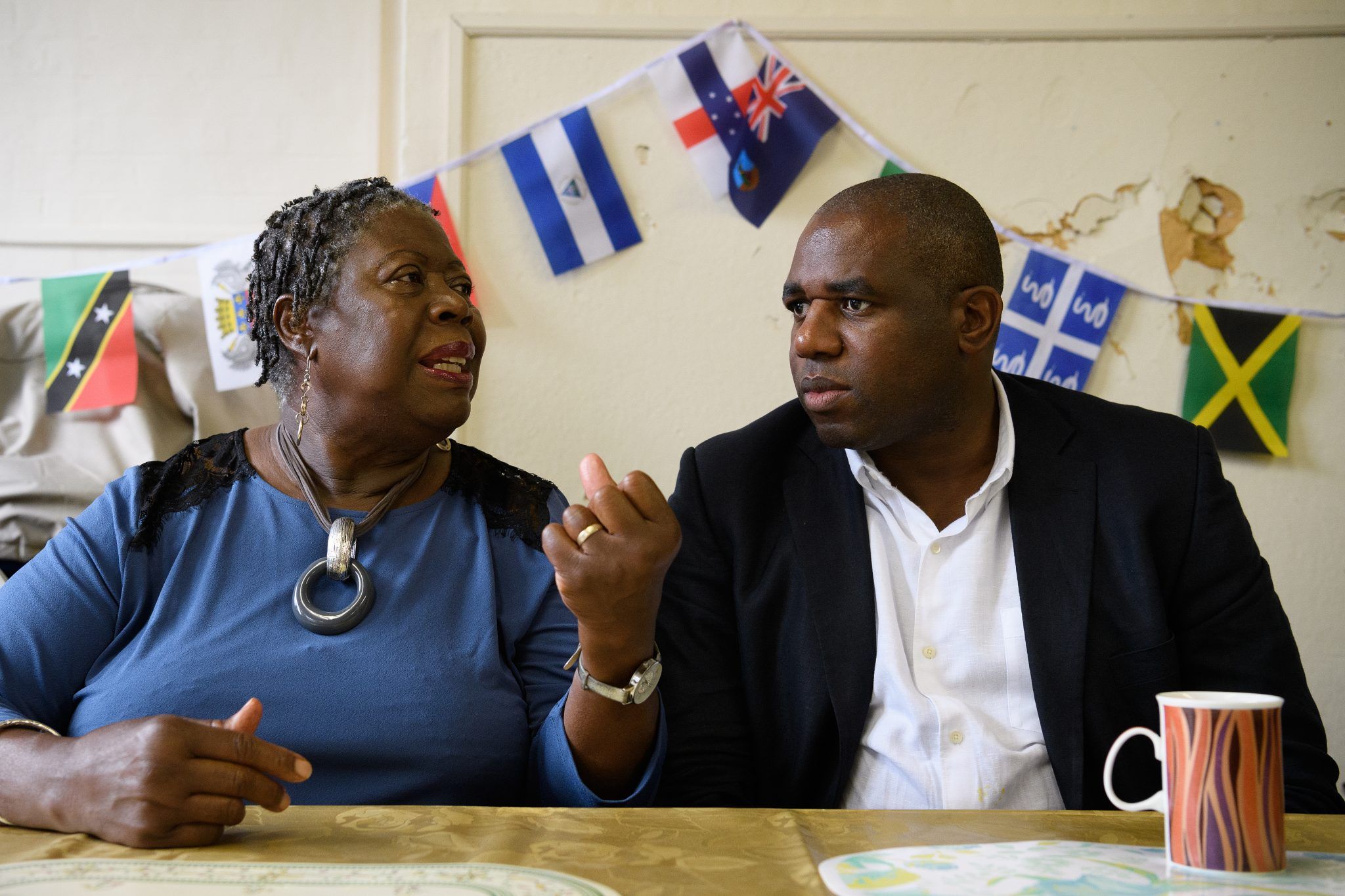

Share
25th May 2021
12:05pm BST

 A Black Lives Matter protest held in June 2020 in London (via Getty)[/caption]
He outlined how, in his view, some policies by the current government are reversing the fight for racial equality - such as the introduction of voter ID.
Government data shows that ethnic minorities are less likely to have an acceptable form of voter ID, with just 53 per cent of Black people holding a driving licence versus 76 per cent of white people.
And the necessity of it is questionable. Electoral fraud is at a consistently low level in the UK - of the 595 alleged cases investigated by the police after the 2019 general election, only 33 related to voter impersonation at a polling station.
However, despite backlash among their own MPs including senior Tory, David Davis, who described it as a "illiberal solution for a non-existent problem", a government spokesperson said: "showing ID to vote is a reasonable approach to combat the inexcusable potential for voter fraud in our current system."
"I feel this is out of a Donald Trump playbook, and years of voter suppression in the US," says Lammy.
The issue of voter ID is a topical issue in the US, where Republican politicians have pushed for its more widespread usage despite the potential it has to disenfranchise ethnic minority voters.
"We should be a country that is pulling down obstacles in the democratic process," he says.
"Addressing the issues of turnout, addressing the millions of people who don't seem to be registered to vote when they're entitled to vote.
"How this could be perceived as a priority issue, I can't tell - it must be, frankly, a cynical political device so that voters who traditionally vote Labour are no longer able to vote."
The introduction of voter ID has the potential to hurt Labour's prospects as ethnic minorities in the UK overwhelmingly vote for the party, with 77 per cent voting for Jeremy Corbyn in 2017.
The ongoing culture war has also manifested in the government's management of the race report, which was initially commissioned in the aftermath of Floyd's murder.
And in a stark admission, Lammy says that he finds discussion of issues around race mentally draining.
[caption id="attachment_273885" align="alignnone" width="2048"]
A Black Lives Matter protest held in June 2020 in London (via Getty)[/caption]
He outlined how, in his view, some policies by the current government are reversing the fight for racial equality - such as the introduction of voter ID.
Government data shows that ethnic minorities are less likely to have an acceptable form of voter ID, with just 53 per cent of Black people holding a driving licence versus 76 per cent of white people.
And the necessity of it is questionable. Electoral fraud is at a consistently low level in the UK - of the 595 alleged cases investigated by the police after the 2019 general election, only 33 related to voter impersonation at a polling station.
However, despite backlash among their own MPs including senior Tory, David Davis, who described it as a "illiberal solution for a non-existent problem", a government spokesperson said: "showing ID to vote is a reasonable approach to combat the inexcusable potential for voter fraud in our current system."
"I feel this is out of a Donald Trump playbook, and years of voter suppression in the US," says Lammy.
The issue of voter ID is a topical issue in the US, where Republican politicians have pushed for its more widespread usage despite the potential it has to disenfranchise ethnic minority voters.
"We should be a country that is pulling down obstacles in the democratic process," he says.
"Addressing the issues of turnout, addressing the millions of people who don't seem to be registered to vote when they're entitled to vote.
"How this could be perceived as a priority issue, I can't tell - it must be, frankly, a cynical political device so that voters who traditionally vote Labour are no longer able to vote."
The introduction of voter ID has the potential to hurt Labour's prospects as ethnic minorities in the UK overwhelmingly vote for the party, with 77 per cent voting for Jeremy Corbyn in 2017.
The ongoing culture war has also manifested in the government's management of the race report, which was initially commissioned in the aftermath of Floyd's murder.
And in a stark admission, Lammy says that he finds discussion of issues around race mentally draining.
[caption id="attachment_273885" align="alignnone" width="2048"] David Lammy talks with Barbara Hope who came to the UK from Barbados in the Windrush generation (via Getty)[/caption]
"I've been in politics for many years, and being asked yet again about the existence of structural racism is not good for my own mental health," he says.
"And it's not good for the health of Britain's Black and minority ethnic communities."
The controversial report released earlier this year was lambasted after it claimed to find "no evidence" of institutional racism in the UK.
Politicians, think tanks, and charities that work in the area of racial equality condemned its findings - along with UN experts , who described it as "reprehensible."
"There is very little left to be said of the report.
"It's been decimated in public, there are very few people who are willing to get behind it other than a few people in Number 10," said Lammy.
"It's lost all credibility, and it certainly doesn't command the broad respect of Britain's minority ethnic communities - in fact, it's been the subject of ridicule and a lot of offence."
David Lammy talks with Barbara Hope who came to the UK from Barbados in the Windrush generation (via Getty)[/caption]
"I've been in politics for many years, and being asked yet again about the existence of structural racism is not good for my own mental health," he says.
"And it's not good for the health of Britain's Black and minority ethnic communities."
The controversial report released earlier this year was lambasted after it claimed to find "no evidence" of institutional racism in the UK.
Politicians, think tanks, and charities that work in the area of racial equality condemned its findings - along with UN experts , who described it as "reprehensible."
"There is very little left to be said of the report.
"It's been decimated in public, there are very few people who are willing to get behind it other than a few people in Number 10," said Lammy.
"It's lost all credibility, and it certainly doesn't command the broad respect of Britain's minority ethnic communities - in fact, it's been the subject of ridicule and a lot of offence."Explore more on these topics: